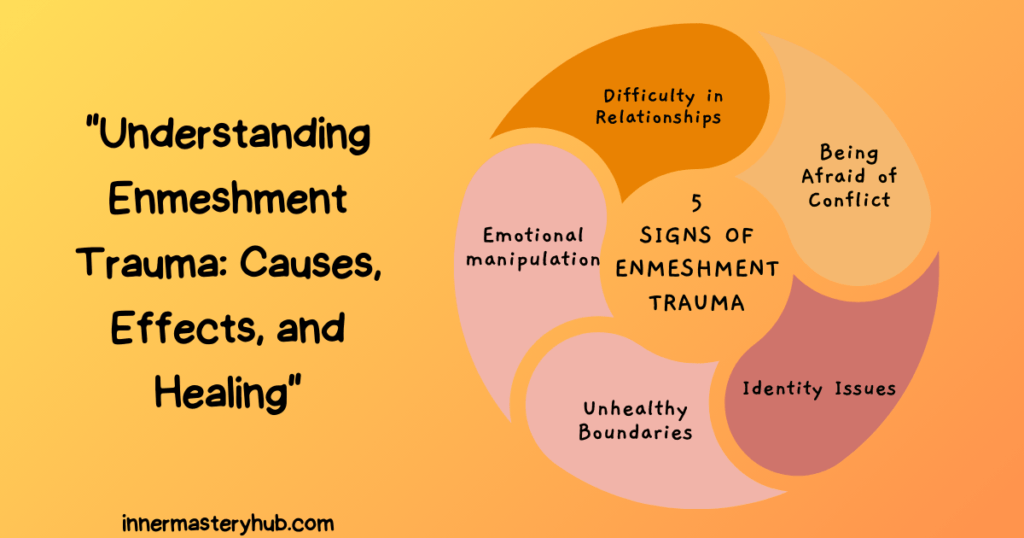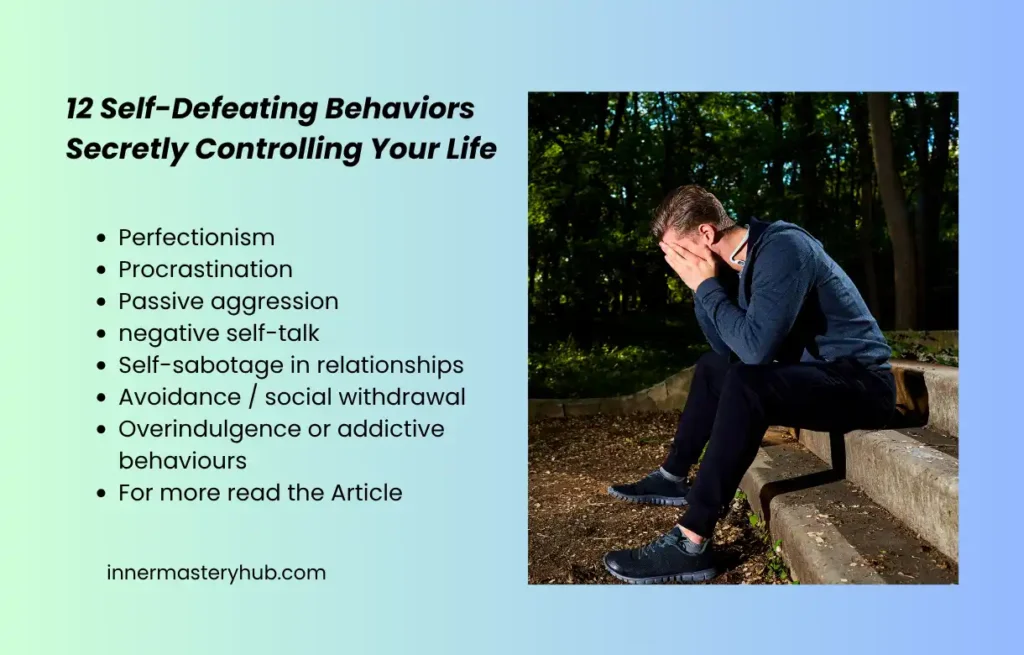The Impact of Enmeshment Trauma: 7 Life-Altering Effects You Need to Know
Effects of Enmeshment Trauma
Enmeshment trauma can cause anxiety, guilt, and difficulty setting healthy boundaries in relationships. Many people grow up feeling responsible for others’ emotions, leading to people-pleasing, low self-esteem, and fear of conflict. Over time, this can impact identity, trust, and emotional regulation, making independence and intimacy feel confusing or unsafe.

Have you ever questioned your own identity and boundaries because someone close to you seemed overly involved in your life, suffocating you with their expectations? You may have suffered from enmeshment trauma, a psychological condition that can impact numerous aspects of your life, if you have been caught up in such turbulent emotions.
What Is Enmeshment Trauma?
Enmeshment trauma develops when personal boundaries are crossed, particularly in family or close relationships, frequently during childhood. When emotional boundaries are unhealthy, the victim typically has a hard time identifying where their feelings finish and the other person’s begin. It might be so overwhelming that it distorts one’s identity.
While most people perceive enmeshment as a psychological condition, it is sometimes associated with overly tight relationships or intense emotional attachment. Enmeshment, however, is more than just intimacy; it’s the improper blending of one person’s emotions with another, which compromises individuality.
Why Enmeshment Trauma is Harmful
Enmeshment is problematic since it blocks personal development and independence. It is challenging for people who were raised in entangled households to set appropriate boundaries in their adult relationships. Confusion about one’s own needs, excessive guilt, and emotional codependency can result from unclear emotional boundaries.
Children are particularly affected by enmeshment trauma. A youngster might believe, for instance, that they are in charge of their parents’ feelings. This might generate a continual anxiety of making decisions that can upset the family dynamic, even as an adult. This dread of upsetting others and the pressure to always address others’ emotional needs can result in deep-rooted anxiety and stress.
Effects of Enmeshment Trauma and Mental Health
Over time, enmeshment has been shown to impact mental health negatively. People from overlapping households are more likely to have problems like grief, anxiety, depression, and low self-esteem, according to studies. Stress is increased by the emotional toll of attempting to uphold strained family relationships without breathing room.
Adults with enmeshment trauma struggle to build healthy relationships. They become overly reliant on their spouses and struggle to form strong emotional ties, fearing they will lose themselves in others.
How Enmeshment Trauma Affects Relationships
Both the self and relationships can be affected by immersion. The lack of boundaries and negative emotional relations related to enmeshment trauma can make it difficult to establish healthy, independent relationships.
In romantic relationships, a person may withdraw out of fear of losing their identity and becoming overly reliant on their partner for emotional support. Healthy partnerships are difficult because of this poisonous cycle of codependency and emotional unavailability.
Effects of Enmeshment Trauma
Here are some signs;
- Blurred personal boundaries within the family.
- Excessive emotional dependence on family members.
- A lack of personal autonomy and self-identity.
- Emotional manipulation and control.
- Inability to express individual thoughts and feelings.
- Limited personal privacy and space.
7 Life-Altering Effects of Enmeshment Trauma
1. Chronic Feelings of Confusion and Lost Identity
One of the earliest warning signs of enmeshment trauma is a constant sensation of confusion about your identity. Enmeshed people have difficulty knowing where they end and others begin. The inability to separate emotions leads to a major loss of self-identity. They may lose touch with who they are as a result of being accustomed to pleasing others and putting others’ interests ahead of their own.
2. Fear of Disappointing Others
People who have experienced enmeshment trauma usually have a deep-seated fear of disappointing others, particularly their carers. The fear is a direct consequence of being raised in an atmosphere where emotional validation was conditional upon achieving others’ demands and expectations. People who are unable to create appropriate boundaries or say “no” have ongoing anxiety because they fear that their actions may upset other people or lead to emotional withdrawal.
3. Difficulty with Boundaries
One of the symptoms of enmeshment trauma is the inability to maintain proper boundaries. When someone has been reared in an atmosphere where their feelings are intertwined with another person’s, they may struggle to set their own boundaries. They’ve been conditioned to give, at the expense of their own well-being, so it can feel nearly hard to say “no” to people or circumstances that emotionally drain them.
4. Difficulty with Emotional Regulation
Emotional control becomes a huge difficulty for persons with lasting enmeshment trauma. Because their emotions have been continually interwoven with another person’s sentiments, it’s hard for them to discriminate between their own emotions and the emotions of others. Repeated emotional outbursts, numbness, or periods of emotional shutdown can result from this lack of emotional autonomy, which can make it challenging to manage emotions healthily.
5. Low Self-Worth and Guilt
Deep feelings of guilt and low self-worth tend to be developed by enmeshment trauma. Enmeshed victims believe that the needs and desires of the person they are entangled with are more significant than their own. When they attempt to put themselves first, they may experience intense guilt because they feel self-centred for making personal demands.
Internalised guilt leads to self-defeating behaviour, self-criticism, and difficulty in accepting praise. It is challenging for them to feel satisfied on their own because their sense of self-worth depends on the approval of others.
6. Toxic Relationship Patterns
People who have undergone enmeshment trauma typically find themselves repeating destructive relationship patterns. Due to the early modelling of entangled behaviours, people may unintentionally seek out relationships that imitate this situation in which emotional boundaries are weak, and their partner may be unduly dependent on them, or vice versa. As a result, both partners may find it difficult to maintain their uniqueness in co-dependent relationships.
7. Chronic Anxiety and Depression
Chronic anxiety and depression are two long-term mental health issues that can be amplified by the cumulative impacts of interpersonal trauma over time. The ongoing fear of failing could severely impact a persons mental condition, the incapacity to set limits, and the emotional agony of living for the approval of others.
While melancholy results from a lack of self-fulfilment, emotional fatigue, and alienation from one’s true self, anxiety is caused by a persistent concern about the expectations and feelings of others. People who have experienced enmeshment trauma deal with these emotional and psychological issues.
Types of Family Enmeshments
Family enmeshment can manifest in various forms, each with its own dynamics and characteristics. Some common types of family enmeshments include:
Parent-Child Enmeshment
One or both parents can grow too dependent on their child, treating them more like a partner or confidant than a child. The most prevalent type is this one. After that, the child might assume too much responsibility for the parent’s emotional needs, leading to a role reversal and neglect of their own development.
Sibling Enmeshment
In certain families, siblings may become intertwined, particularly if there is a significant age gap or a shared trauma. This could lead to emotional reliance, overly intimate relationships, or a lack of independence.
Multi-Generational Enmeshment
Close relationships among parents, grandparents, and children can lead to generational entanglement. This could lead to a never-ending cycle of emotional reliance and blurred boundaries.
Marital Enmeshment
Sometimes a pair becomes so emotionally entangled that they lose their identity and become overly dependent on one another. Personal growth gets hampered, and the relationship suffers.
Extended Family Enmeshment
With aunts, uncles, cousins, and in-laws being unduly involved in each other’s lives, often at the price of personal autonomy and boundaries, large family networks can also become intertwined.
Cultural or Religious Enmeshment
In certain religious or cultural situations, making decisions as a group and preserving family unity may be highly valued. When personal independence is subordinated to family or community demands, entanglement may result.
Therapeutic Approaches to Treat Enmeshment Trauma
- Individual therapy, including talk therapy or cognitive-behavioural therapy.
- Family therapy to address enmeshment dynamics collectively.
- EMDR (Eye Movement Desensitisation and Reprocessing) for trauma processing.
- Mindfulness and relaxation techniques to manage emotional dysregulation.
- Support groups to share experiences and coping strategies.
- Inner children work to heal past wounds.
- Expressive therapies like art or music therapy explore emotions.
Enmeshment Trauma Dynamics Between Cultures
Because cultural norms and beliefs impact family relationships differently, the impacts of enmeshed trauma varied by culture. In collectivist civilisations such as Italy and Japan, family closeness and interdependence can lead to entanglement, as personal boundaries are often subordinated to family or community goals.
US cultures with strong individualistic beliefs may be less connected yet experience different emotional detachment concerns. Treatment approaches and strategies that are culturally responsive are necessary to address enmeshment trauma.
Research indicates that children and teenagers from South Korean households in the US may benefit from enmeshment, even though European Americans may see it unfavourably for personal growth. Teenagers in the UK were impacted by family entanglement, but Italian adolescents, who are more collectivistic, were not, according to a different Journal of Marriage and Family study.
Overcoming The Effects of Enmeshment Trauma
- To overcome emotional confusion, recognise and understand enmeshment trauma.
- Develop your self-identity by identifying and isolating your needs from others.
- To safeguard emotional wellness, establish and uphold healthy boundaries with loved ones.
- Develop self-compassion and confront low self-esteem beliefs.
- Practice emotional regulation skills to control overpowering feelings.
- Develop boldness so you may voice your demands without fear or shame.
- Create a network of understanding individuals who respect your personal space.
- Relearn self-care and schedule time for pursuits that support personal development.
Takeaway
Being close to someone is not the onlycause of enmeshment trauma; it also involves losing your sense of self in the process. Regaining a sense of personal identity and autonomy and resolving the emotional struggle are the true challenges. The first step to recovery is realising that enmeshment is a trauma.
Instead of adopting the surface-level advice of “just set boundaries, “focus on understanding the emotional and psychological origins of the issue. With this knowledge, you can start to recover from the long-lasting consequences of enmeshment trauma and find your true self again.
FAQS about Effects of Enmeshment Trauma
Do the effects of enmeshment trauma cause PTSD?
Enmeshment, a dysfunctional family dynamic with unclear boundaries, can lead to mental pain and trauma. Even though it might not be the main cause of PTSD, it can worsen its symptoms, particularly when there has been significant emotional abuse or neglect.
What is enmeshment trauma?
When family members’ personal boundaries are compromised, it can result in enmeshment trauma, which makes them overly emotionally involved and dependent. Emotional autonomy and the formation of personal identity can be hindered by this dynamic.
How do the effects of enmeshment trauma affect relationships?
People who have experienced enmeshment trauma may find it difficult to set up appropriate boundaries, which can result in codependency, abandonment anxiety, and trouble building independent relationships.
What are common signs of the effects of enmeshment trauma?
Lack of privacy, feeling responsible for other people’s feelings, difficulty making decisions on your own, and an imprecise sense of who you are are all warning signs.
What role do parents play in enmeshment trauma?
In an attempt to provide companionship or emotional support, enmeshed parents often become overly involved in their kids’ lives, which may interfere with their kids’ independence.
Are the effects of enmeshment trauma the same as codependency?
While codependency refers to unstable relationship patterns where one person tolerates another’s bad behaviour, enmeshment trauma means compromised familial boundaries that result in dependence.
How do the effects of enmeshment trauma impact self-identity?
People may experience reduced self-awareness as a result of their inability to differentiate their own emotions and desires from those of family members.
Can the effects of enmeshment trauma impact mental health?
Indeed, the absence of personal boundaries and autonomy can result in emotional dysregulation, anxiety, sadness, and low self-esteem.
What steps can be taken to overcome enmeshment trauma?
Healing from enmeshment trauma requires self-reflection, treatment, and a setting of clear boundaries.
How does enmeshment trauma affect adult relationships?
Adults have ingrained patterns in their relationships, making it difficult to form wholesome, self-sufficient partnerships.






